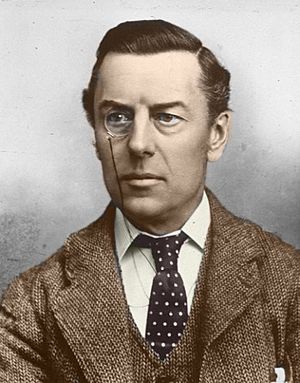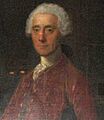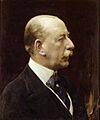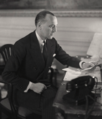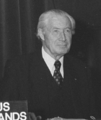Secretary of State for the Colonies facts for kids
The Secretary of State for the Colonies was an important government minister in the United Kingdom. This person was in charge of managing many parts of the British Empire. Think of them as the main boss for Britain's colonies around the world.
However, the Colonial Secretary was never responsible for British India. India had its own special minister called the Secretary of State for India.
From 1768 until 1966, the Colonial Secretary had help from other officials, like an Under-Secretary of State for the Colonies.
Quick facts for kids Secretary of State for the Colonies |
|
|---|---|

|
|
| Colonial Office | |
| Style | The Right Honourable |
| Member of | |
| Reports to | Prime Minister |
| Nominator | Prime Minister |
| Appointer | The Monarch
(on the advice of the Prime Minister)
|
| Term length | At His Majesty's pleasure |
| Formation |
|
| First holder |
|
| Final holder |
|
| Abolished |
|
| Deputy | Under-Secretary of State for the Colonies |
Contents
History of the Role
Before the Colonial Secretary role existed, other government officials shared the job of looking after the colonies. These included the Board of Trade and the Secretary of State for the Southern Department. The Southern Department Secretary handled things like Ireland, the American colonies, and relations with some European countries.
First Colonial Secretary: 1768–1782
The job of Colonial Secretary was first created in 1768. This was because the North American colonies were becoming more difficult to manage. This new role was meant to focus on these growing problems.
However, after Britain lost the American colonies, the Colonial Secretary position was ended in 1782. After that, the duties for the colonies were given to the Home Secretary.
Colonial Duties: 1782–1854
For many years after 1782, the responsibility for the colonies changed hands several times:
- The Home Secretary handled colonial affairs from 1782 to 1801.
- Then, the Secretary of State for War and the Colonies took over from 1801 to 1854. This meant one person was in charge of both war and the colonies.
In 1794, a new office was created for Henry Dundas called the Secretary of State for War. This office then took on the responsibility for the colonies. In 1801, it was renamed the Secretary of State for War and the Colonies.
Colonial Secretary Returns: 1854–1966
In 1854, there were big changes in how the government was organized. The jobs of managing the colonies and military affairs were separated. Sir George Grey became the first Secretary of State for the Colonies under this new arrangement.
Later in the 1800s, Britain gained control over many "protectorate" territories. These were places that Britain protected and had some control over, but they weren't officially colonies. At first, the Foreign Secretary was responsible for these.
By the early 1900s, the Colonial Secretary also became responsible for these protectorates. After World War I, new territories called "mandated territories" were added to the Colonial Office's duties. These were territories that the League of Nations asked Britain to manage.
In 1925, a part of the Colonial Office was separated to form the Dominions Office. This new office had its own minister and was responsible for dealing with the Dominions. Dominions were countries like Canada and Australia that were part of the British Empire but had more self-governance.
After World War II, many British territories became independent. Because of this, the Colonial Office was merged in 1966 with the Commonwealth Relations Office. This new office was called the Commonwealth Office. The minister in charge became the Secretary of State for Commonwealth Affairs.
In 1968, the Commonwealth Office joined with the Foreign Office. This new, larger department was renamed the Foreign and Commonwealth Office (FCO). This means that the original role of Secretary of State for the Colonies no longer exists. Its responsibilities are now handled by the Foreign Secretary.
The term "colony" stopped being used after the British Nationality Act 1981. Britain's rule over Hong Kong, which was the last major colony, ended in 1997. Today, Britain still has some overseas territories.
Secretaries from the Colonies
Some of the people who held the title of Colonial Secretary were actually born in colonies or other countries:
- Bonar Law was born in New Brunswick, which was a colony that later became part of Canada. He later moved to the United Kingdom.
- Victor Bruce, 9th Earl of Elgin was born in Canada. His father was the Governor General of Canada at the time.
- Alfred Milner, 1st Viscount Milner was born in the Grand Duchy of Hesse (which is now part of Germany).
- Leo Amery was born in British India. His father was English and serving in India.
Images for kids
-
Wills Hill, the first Earl of Hillsborough.
-
William Legge, the second Earl of Dartmouth.
-
Sir William Molesworth.
-
Edward Stanley, the 15th Earl of Derby.
-
Sir Edward Bulwer-Lytton.
-
Henry Herbert, the 4th Earl of Carnarvon.
-
Richard Temple-Grenville, the 3rd Duke of Buckingham and Chandos.
-
Granville Leveson-Gower, the 2nd Earl Granville.
-
John Wodehouse, the 1st Earl of Kimberley.
-
Sir Michael Hicks Beach.
-
George Robinson, the 1st Marquess of Ripon.
-
Victor Bruce, the 9th Earl of Elgin.
-
Robert Crewe-Milnes, the 1st Marquess of Crewe.
-
Alfred Milner, the 1st Viscount Milner.
-
Victor Cavendish, the 9th Duke of Devonshire.
-
Sidney Webb, the 1st Baron Passfield.
-
George Lloyd, the 1st Baron Lloyd.
-
Walter Guinness, the 1st Baron Moyne.
-
Robert Gascoyne-Cecil, Viscount Cranborne.
-
Frank Pakenham, the 7th Earl of Longford.
See also
 In Spanish: Secretario de Estado para las Colonias para niños
In Spanish: Secretario de Estado para las Colonias para niños
 | Dorothy Vaughan |
 | Charles Henry Turner |
 | Hildrus Poindexter |
 | Henry Cecil McBay |


